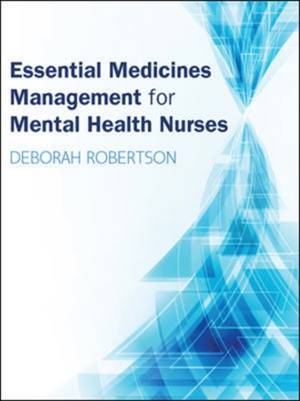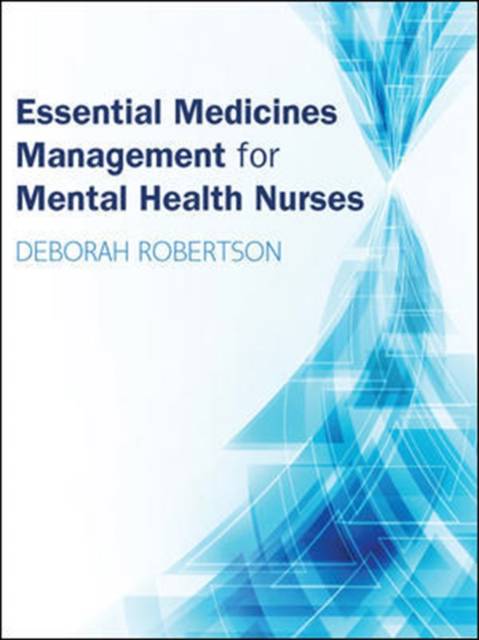
- Afhalen na 1 uur in een winkel met voorraad
- Gratis thuislevering in België vanaf € 30
- Ruim aanbod met 7 miljoen producten
- Afhalen na 1 uur in een winkel met voorraad
- Gratis thuislevering in België vanaf € 30
- Ruim aanbod met 7 miljoen producten
Omschrijving
This text is an accessible and clinically practical guide to medicines management in mental health for all student nurses and professionals. Making the topic manageable and understandable at undergraduate nurse level, it also encourages a growing understanding beyond this in professional practice too.
A wide range of mental health conditions are covered, along with how medication can be used to manage these conditions, how the drugs work and how they should be given. Exploring the legal aspects and ethical issues around medication management in mental health, it also discusses other concepts such as medicines adherence and the therapeutic alliance.
The book uses straight-forward language to help the reader master the key concepts and how to apply them to clinical practice. It features:
- Drug calculations and multiple choice questions to help you assess your learning
- Key learning points to sum up each chapter
- Patient case studies across a range of mental health disorders
- References and suggested reading to help take your knowledge and learning further
The book places an emphasis on applying underpinning pharmacological principles to clinical practice and is useful to all nurses who work with patients who have a mental health disorder.
"A knowledge and understanding of medicines and medication management is a fundamental aspect of the role of the mental health nurse. The author succeeds in her aim of providing of both a basic knowledge of the subject area, and an understanding of how the principles of psychopharmacology and medicines management are applied to clinical practice and the role of the nurse.
The book has an excellent structure, each chapter beginning with clear learning objectives, and ending with a summary of key learning points; multiple choice questions, and a case study, where relevant. The text is written in an accessible style; specific chapters, for example, chapter 5 "Anatomy and physiology of the brain", having clear diagrams that facilitate the reader's ability to understand both basic physiology, and the principles of neurotransmission, etc. The role of the therapeutic alliance is helpfully acknowledged when promoting adherence and concordance, whilst the key medications prescribed for the specified disorders, and the associated psychopharmacology, are clearly described.
"I would consider the publication as being essential reading for any undergraduate mental health nurse; the text also being a valuable learning resource in the development of curriculum content."
Mark James, Senior Lecturer in Community Mental Health Nursing, University of South Wales, UK
"I'm delighted to recommend this new, welcome and accessible resource: an excellent book with much to offer student and registered mental health nurses and nurse educators, in promoting safe and effective practice in medicines management. With an easy to understand style, Deborah Robertson provides a helpful overview of the legal and professional context, a practical introduction to undertaking drug calculations, and considers the complex issues around practical strategies for optimising adherence and patient outcomes. Complementing recommended non-pharmacological interventions for well-known mental health disorders, this book offers a refreshing perspective and special focus upon pharmacological treatment options, clearly explaining the use of specific medications, their main modes of action, effects and side effects, and recommendations for monitoring outcomes.
In particular, this book offers the reader a very good grounding in understanding the pathophysiology and pharmacological treatment of mental health disorders, providing materials and highlighting further resources for use when working with the patient or service user, whe
Specificaties
Betrokkenen
- Auteur(s):
- Uitgeverij:
Inhoud
- Aantal bladzijden:
- 194
- Taal:
- Engels
- Reeks:
Eigenschappen
- Productcode (EAN):
- 9780335263981
- Verschijningsdatum:
- 16/08/2016
- Uitvoering:
- Paperback
- Formaat:
- Trade paperback (VS)
- Afmetingen:
- 189 mm x 246 mm
- Gewicht:
- 353 g

Alleen bij Standaard Boekhandel
Beoordelingen
We publiceren alleen reviews die voldoen aan de voorwaarden voor reviews. Bekijk onze voorwaarden voor reviews.









